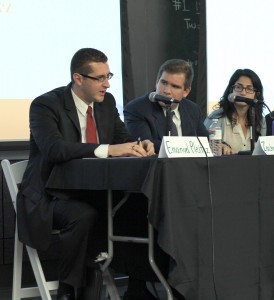Mayoral hopeful speaks about education policy
Los Angeles Mayoral candidate Emanuel Pleitez gave students a glimpse of his views on education policy at a Monday night event in the Taper Hall of Humanities.

Focus · Los Angeles mayoral candidate Emanuel Pleitez (left) discusses public education with teachers Zachary Sokoloff and Lila Kalaf from Teach for America. – Joseph Chen | Daily Trojan
The event, hosted by USC’s Political Student Assembly and Teach for America, drew a crowd of about 30 people. Justin Bogda, the assistant director of the Political Student Assembly and a junior majoring in environmental studies and international relations, and Maheen Sahoo, a junior majoring in philosophy, politics and law, who serves as a campus campaign coordinator for Teach for America at USC, organized the event.
Emanuel Pleitez, 29, currently serves as chief strategy officer at Spokeo, a technology company in Los Angeles. After graduating from Stanford in 2006, Pleitez worked at Goldman Sachs, was a member of the Obama-Biden Presidential Transition Team, a member of the President’s Economic Recovery Advisory Board and a management consultant for McKinsey and Company. Pleitez also previously served as current Mayor Antonio Villaraigosa’s personal assistant.
Aside from his professional qualifications, Pleitez discussed how his experience as an Angeleno has impacted his campaign for mayor.
Pleitez emphasized how his own childhood experiences as a first-generation American in the Los Angeles Unified School District inspired him to make education one of his focuses. He proposed possible solutions Los Angeles can undertake to improve public schools and advocated reapportioning the city budget.
Pleitez highlighted some statistics from LAUSD schools in his presentation, which indicate why the school district seems to be struggling.
“There’s so many variables at play, from the biggest indicator of student success being the education level of parents. In L.A., if you did a study just on that, we’re already at the bottom of almost every region in the country,” he said.
Bogda said he hoped the event would help get students thinking about the importance of education.
“I think going to such a big school in South Central Los Angeles that kind of works with the community, having partnerships with a bunch of different high schools, a bunch of different feeder programs, makes education really relevant,” Bogda said.
The panel, composed of Teach for America teachers Lila Kalaf and Zachary Sokoloff in addition to educators Sean Holiday and Baltazar Vega, analyzed education and policy in Los Angeles. Art Auerbach, an assistant professor of political science, moderated the discussion.
Though they saw many problems with the public education system, panelists did acknowledge that the recently passed Proposition 30 gives schools some leeway. The proposition created a tax plan to raise money that prevents budget cuts in education.
“Prop. 30 passing allows us to breathe a little bit more so we can focus on where we get to spend our resources and we get to think a little bit more clearly,” Vega said.
Panelists also touched on the influence that charter schools have on the education system overall. Holiday and Vega, administrators at L.A.-area charter schools, said the fact that these schools function as a meritocracy makes them valuable indicators of learning.
“One thing I like about charter schools is that if we’re doing bad, we’re no longer going to exist,” said Vega.
Sokoloff also added that a benefit of charter schools is that they can be “laboratories of innovation” and he hopes work on the education system doesn’t end there.
“I really hope the charter school movement turns into finding ways to bridge the gap between district schools and charter schools,” Sokoloff said.
Despite some of the hurdles L.A. schools will face in the coming months, Pleitez remained hopeful.
“For the future, am I optimistic?” Pleitez asked. “Absolutely, because we’ve gone through so much.”
